Blue and Gold Macaws (Ara ararauna) are among the world’s most breathtaking species of parrots, with vibrant blue and golden-yellow plumage. Also, being one of the intelligent birds and natives of South America. However, the blue and gold macaw care is the core responsibilities that count in keeping them as a pet. As a pet owner of a macaw, you should be careful in this regard.
Eventually, the more care is given to them, the more they thrive and have long lifespans. So, caring is a key that can be both rewarding and demanding. They need a lot more other things along with spacious living environments, a well-balanced diet, and regular veterinary check-ups.
Table of Contents
Not only are they visually captivating, but their incredible social skills and affection help them form stronger connections and bond with their owners.
It may seem challenging for first-time owners. However, with proper training, a structured routine, and an understanding of their behavior. All these things may work in a macaw’s well-being for a healthy and happy bird.
This guide is designed just for you and will walk you through everything you need to know about blue and gold macaw care, from housing to matters like legal considerations. Let’s find together if a Blue and Gold Macaw is the right pet for you and how to give them the best possible life.
Lifespan & Characteristics
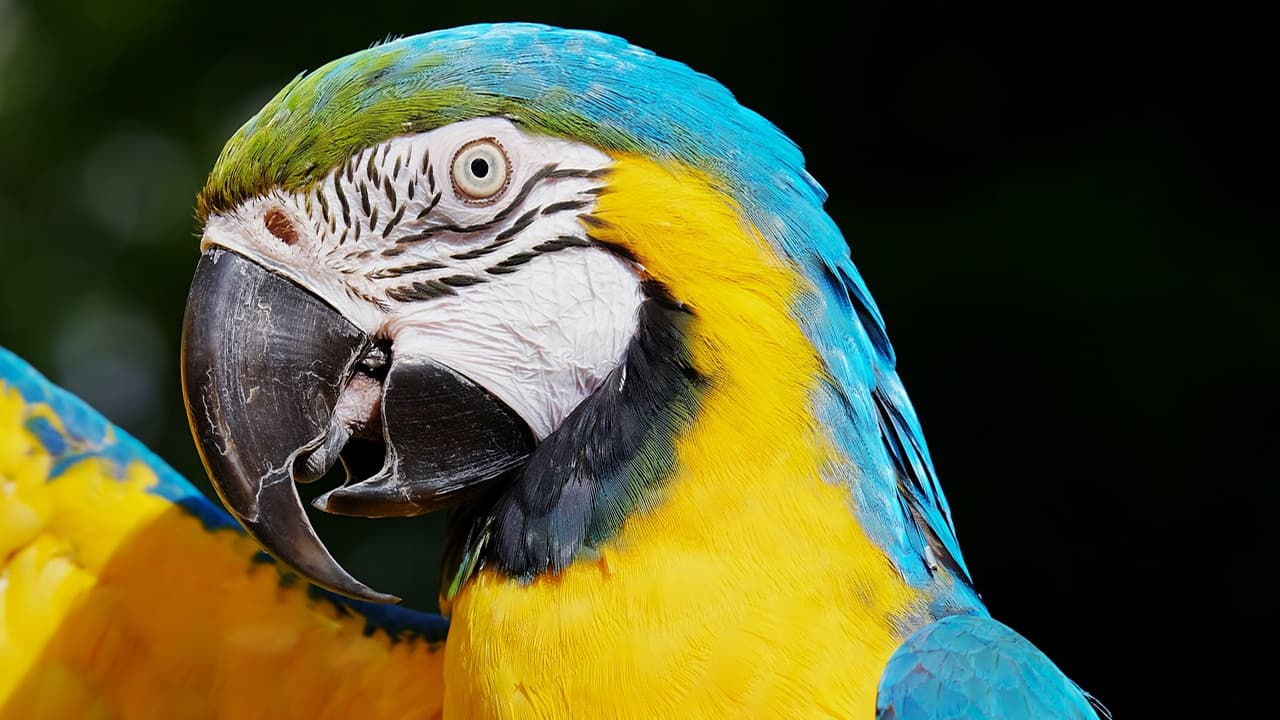
Blue and Gold Macaws live long lifespans. But to make them live a healthy and flourishing life, their care is essential. For instance, these macaws can live between 30 and 50 years in captivity. However, some may also live more exceeding to 70 years, if they are nurtured in stress-free environments.
Due to their long lifespan, owning a Blue and Gold Macaw is a significant commitment, often lasting for multiple generations within a family. The things that make them functional in both their mental and physical health require 3 main things. These things are training, daily interactions, and socialization that maintain their wellness.
Physical Characteristics
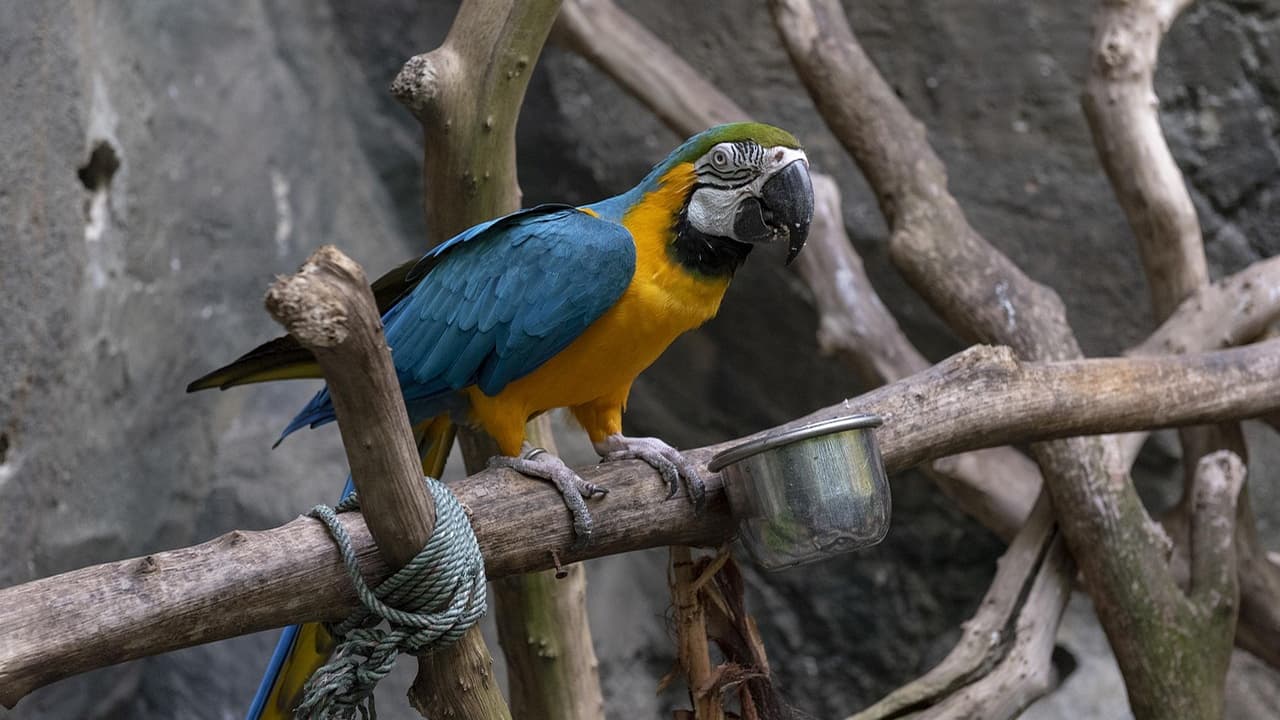
Talking about their physical characteristics, they are the largest parrots in the world. Their strikingly vibrant plumage sets them apart from the usual pet birds. The physical characteristics may include the following:
- Size: They are large-sized birds with a length typically measured from 30 to 36 inches. The long yet elegant tail feathers require ample space for them to move and stretch out.
- Weight: The healthier macaws weigh between 900 to 1,200 grams (in pounds, it may be around 2 to 3 pounds). For the prevention of health-related issues, it is very important to include a proper diet and exercise.
- Wingspan: The blue and gold macaw wingspan reaches up to 41 inches, which makes them powerful flying birds.
- Beak Strength: The beak of a macaw is its most defining and powerful feature that has the capability of cracking hard shells and nuts. It may also have the power to break wooden furniture. To prevent any damage to the furniture, it is essential to provide them with chewable and durable toys.
Suitability as a Pet
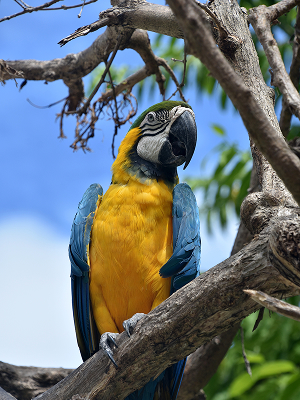
Owning a Macaw is not an easy thing to do, as it is just not a casual pet choice but a lifetime responsibility. Although they are the most stunning, highly intelligent, and affectionate birds on earth. Still, they are not ideal for every household. The reason could be that their long lifespan, high energy levels, and demanding nature are not catered to by every caretaker, especially the inexperienced ones.
So, a committed homeowner is suitable for looking after these parrots and their needs, too. The suitability may vary from owner to owner. To make it easier for you, we have listed some pros and cons of adopting blue and gold macaws. Here you go:
Pros
- These macaws are highly intelligent and trainable.
- They form deep and strong bonds with their owners.
- Visually attractive species of parrots with beautiful and eye-catching plumage, making them a true showpiece pet.
- They can mimic speech and learn around 50 to 100 words.
Cons
- The macaws cannot be kept in cages for a whole day, they require at least 4 to 5 hours outside the cage. These birds need a lot of stimulation and space as well. Otherwise, they’ll get into boredom-related behaviors.
- Especially during morning and evening hours, they scream extremely loudly. Thus, reaches up to 100 decibels.
- It might get expensive to maintain these macaws. Their feed, veterinary checkups, and so on will cost you a lot and get heavy on your pockets.
- If you are a person who cannot tolerate the cons of keeping a blue and gold macaw as a pet, then this is not a suitable choice for you. But if you are dedicated and can provide them with the required care, space, and time, you’ll find them the loveliest creatures ever.
Housing and Environment
The housing and environment play a crucial role in petting these large parrots. Things that must be taken into consideration might include:
1. Cage Requirements
The blue and gold macaw cage must be spacious for them to easily stretch their wings and move freely from here to there. A small cage is not a suitable option, leading to frustration and feather-plucking behaviors in them.
2. Bar Spacing
Bar spacing needs to be from 1 to 1.5 inches, preventing them from getting stuck or injured. The wider gaps will let them escape, while the smaller ones will cause injuries to the toes.
3. Material
The materials used in zinc-coated or lead-based products are toxic to birds. However, it is suggested to choose stainless steel cages(they are durable and safe).
4. Litter and Cleaning
Then comes the cleaning up of litter, and for that, you are recommended to use paper-based bedding or grate flooring. It eases cleaning up the litter and prevents the buildup of harmful bacteria.
5. Play Stand
A sturdy play stand fulfills its purpose of entertaining the macaws. It entertains them with climbing ropes, ladders, and swings attached to this play stand, so invest wisely in it.
6. Toys
The toys ideal for climbing and beneficial for beak health include wooden blocks, puzzle feeders, ropes, bells, and hanging toys.
7. Safe Environment
Be sure to provide them with a safe play area free from toxic things like plants, electrical wires, and household hazards. Therefore, macaws are naturally curious about chewing hazardous objects if they are left unsupervised.
Diet and Nutrition
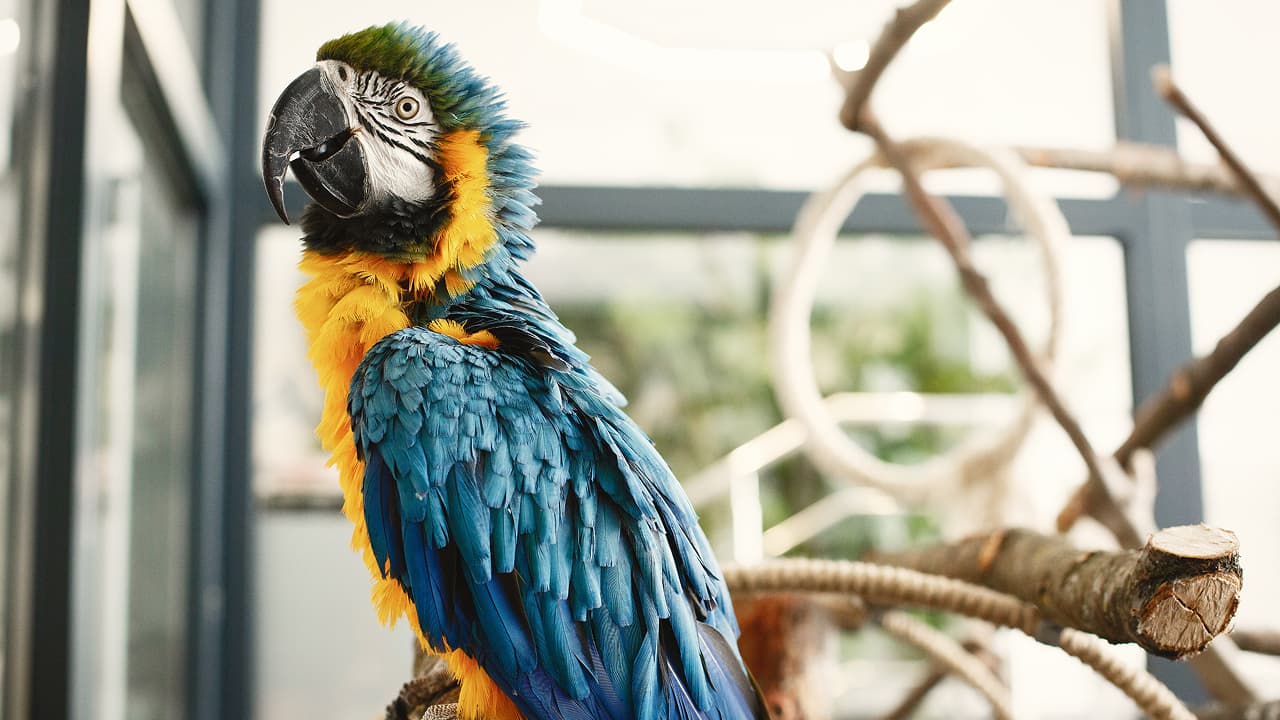
A macaw parrot requires a balanced and nutritious diet. It is beneficial for their overall wellness. If there isn’t properly fed, they may face health problems accompanied by deficiencies.
What Should Blue and Gold Macaws Eat?
The diet of a macaw should be exactly like what they eat in the wild and fulfill the nutritional values. They must consume the following in their diet:
- Pellets (50-60% of diet): The pelleted feeds are helpful in the prevention of deficiencies and fulfill the need for vitamins, proteins, and minerals.
- Fresh Fruits & Vegetables (30-40% of diet): Fruits and veggies add variety, fiber, and essential nutrients to their diet.
- Nuts & Seeds (10% of diet): While nuts and seeds are high in fats, they are still an important energy source for macaws.
Foods to Avoid
There are certain foods that macaws should avoid in their diet: The toxic ones are:
- Avocados have persin in them that is toxic to health.
- Chocolate is also fatal for parrots as it contains theobromine.
- Caffeine causes cardiac issues. So, it is strictly prohibited to feed your birds with tea, coffee, and energy drinks.
- Processed snacks or high-fat foods may lead to obesity and liver problems for your pet birds. It is recommended to avoid these salty foods.
Behavior and Training
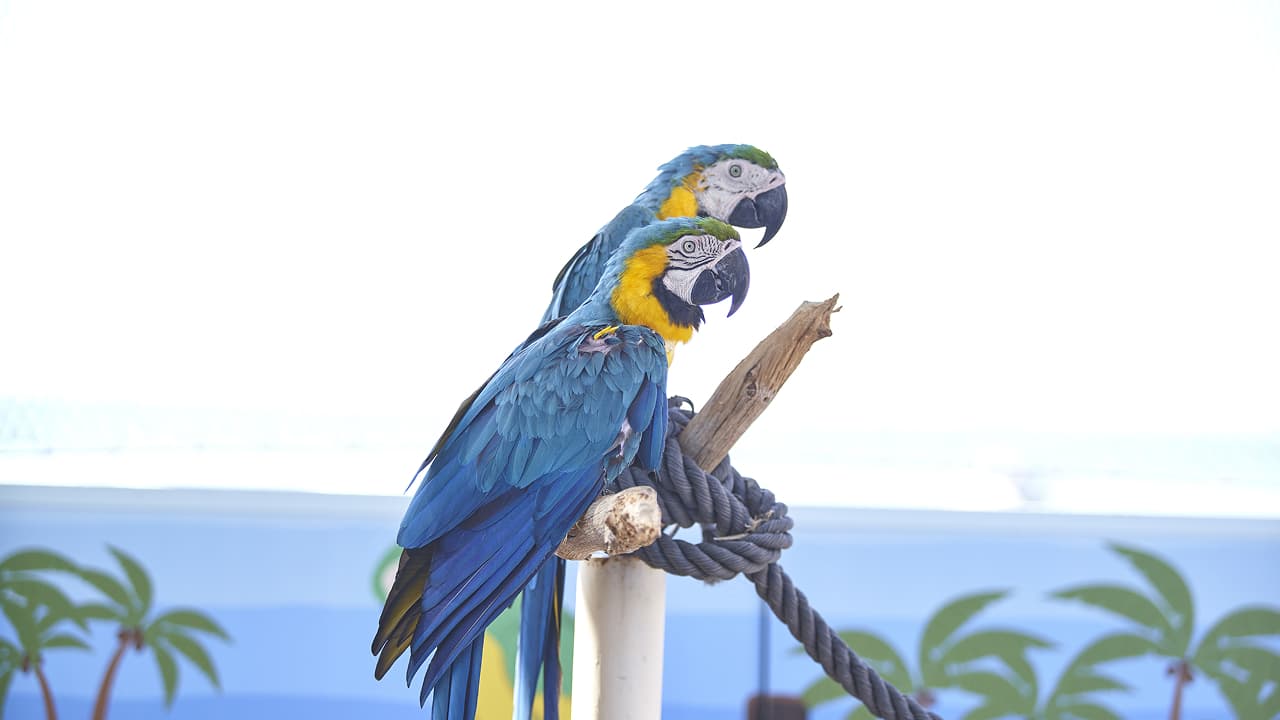
Blue and Gold Macaws are famous for their playful personalities, intelligence, and social nature. They form strong bonds with their human caregivers and require constant mental stimulation to stay happy and healthy. Without proper interaction, they may develop destructive behaviors or excessive screaming.
Common Behaviors
- They are affectionate but have a need for attention and social interactions. If they are not properly catered to in socialization, then they might show jealousy or clinginess.
- Macaws have a very loud voice, and they are vocal, too. This behavior is not suitable for people living in noise-sensitive apartments or houses.
- The powerful beaks and an instinct to chew a common traits in them. So, there are chances they may chew household items or furniture if they are not provided with bird-safe wooden toys to satisfy their chewing instincts.
Training Tips
Here are some training tips that may work for your macaw pet care:
- Use Positive Reinforcement with praises or treats, etc. Try never to yell at them or punish them.
- Be consistent in using the same words and gestures for training to make your macaws understand your given cues better and faster.
- Encourage them when they talk or mimic something.
- Try to address the behavioral issues as early as possible and try to address the cause of such behaviors.
Related Picks: 18 Different Species of Macaws in The World
Grooming and Maintenance
They should be kept well-groomed, which is beneficial for their wellness and comfort as well. A lot of effort for their cleanliness is not necessory, as they are naturally clean birds. Even though they still require to have maintained feathers, beak, and nails in excellent condition.
Importance of Regular Veterinary Visits
At least once a year, Macaws should visit an avian veterinarian for their full health check-up. The routine examinations will help in detecting early illness and increase the chance of preventing diseases, leading to timely treatments. Ensure to visit regularly so that undetected conditions do not worsen.
Common Health Issues
These macaws can suffer from several health problems, many of which are preventable. If proper care and hygiene are not provided, it might lead to severe health diseases. Blue and Gold Macaw care plays a crucial role in keeping them healthy. They are the following ones:
- Psittacosis (Parrot Fever)
- Beak and Feather Disease (PBFD)
- Respiratory Infections
- Vitamin A Deficiency
- Obesity and Fatty Liver Disease
Breeding and Reproduction
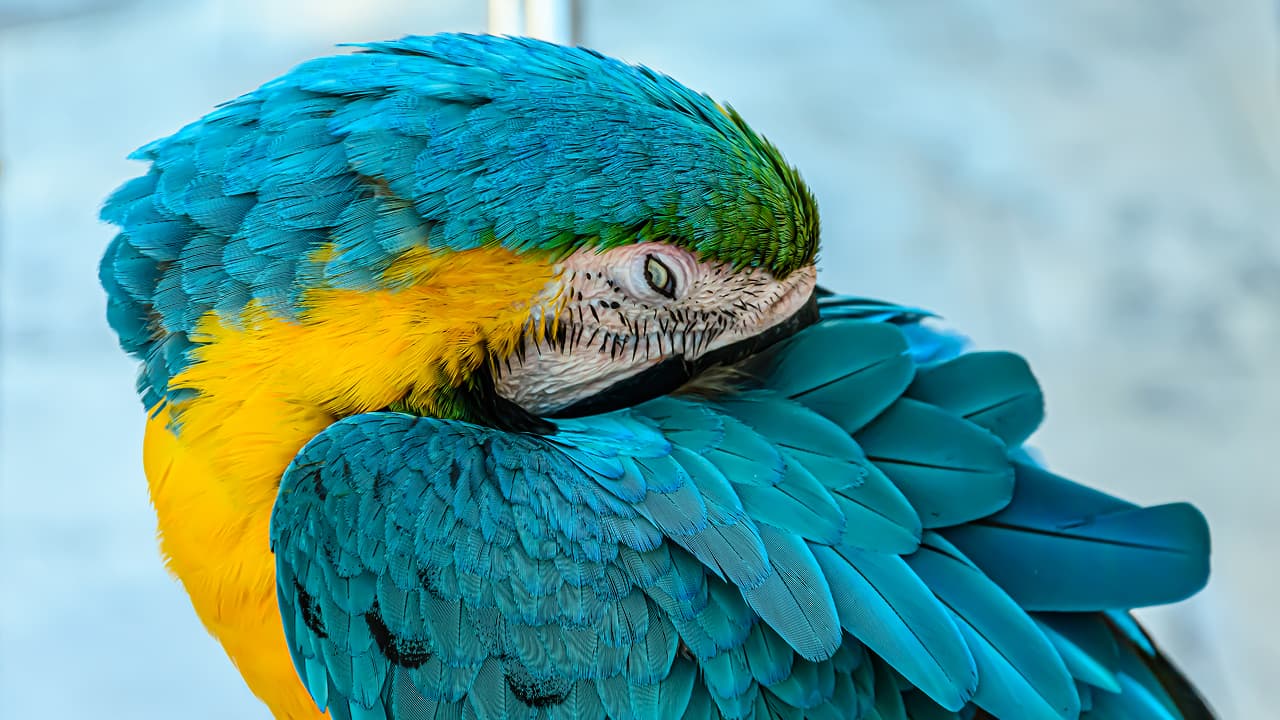
A complex and most crucial phase in a macaw’s life is their breeding process. The right environment with dedication plays a huge role in succeeding in the reproduction. So, it solely depends on the caregivers to provide them with a sound and stress-free environment where they can bond and interact with their mates, reaching towards their goal of breeding. Blue and Gold Macaw care is essential in ensuring a suitable breeding environment.
These Blue and Gold Macaws reach sexual maturity at the age of 5 to 7 years. But that does not mean they are capable of breeding. It should be ensured that they are well-nourished and mentally prepared before getting into the process of breeding. Those pairs who show affection towards each other are more likely to breed successfully. Feeding each other, mutual preening, and vocalizing together all count as affection.
Training and Speech Development
Training them from an early and young age is the best time. Try to familiarize them with words and commands, as their chances may increase to make them learn and pick up speech patterns and behavioral cues. Also, the use of treats, praise, and affection will make it more fun for them. Therefore, this positive reinforcement will encourage them in their learning towards speech development.
Blue and Gold Macaw care includes consistent training to enhance their speech abilities. Understanding speech development is very important. This could be because they can mimic speech, but their pronunciation may not be clear or perfect all the time.
Some may not have developed clear voices, while others may have a raspy or robotic sound. Irrespective of words, macaws can often whistle, laugh, and mimic household sounds, like those of doorbells and phone ringtones. Even many of the few may develop their funny catchphrases because of their environment!
Legal & Ethical Considerations
Before owning a macaw, stay informed of the legal and ethical considerations. The deforestation and illegal pet trade led to the protection of the Blue and Gold Macaws under CITES (Convention on International Trade in Endangered Species).
Ensure you get your bird from an ethical source or breeder. Avoid purchasing it from illegal sources, as this is traumatic, harming these wild populations and contributing to cruelty.
Conclusion
Taking care of a Blue and Gold Macaw means having a rewarding yet demanding experience. They tend to thrive if they find a loving and stimulating environment. Here, they will be getting proper nutrition, training, and companionship.
If you are ready and able to meet its needs, then there’s nothing more adorable than to pet a blue and gold macaw. Nurturing this lifelong companion by always sourcing your macaw ethically and staying informed in caring matters.
